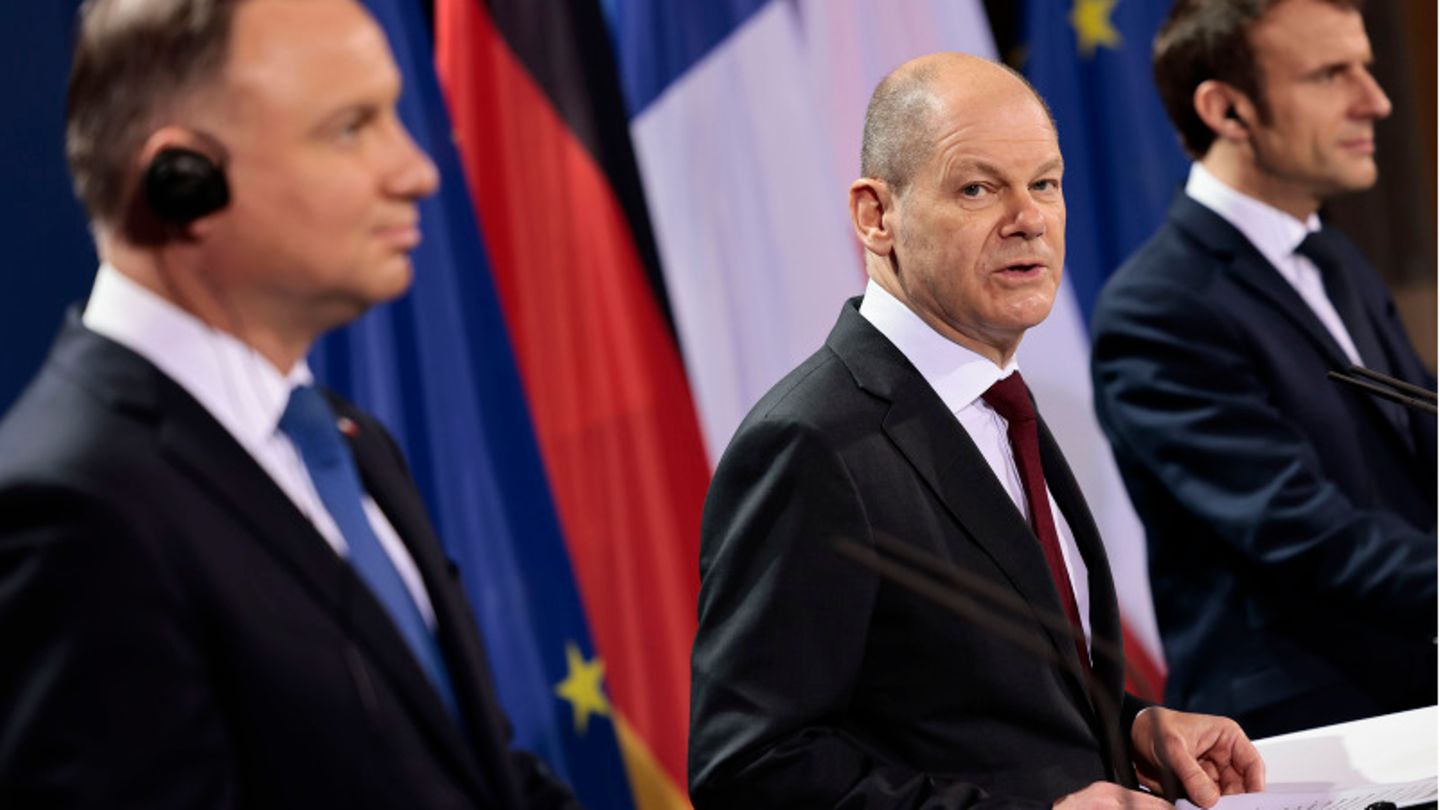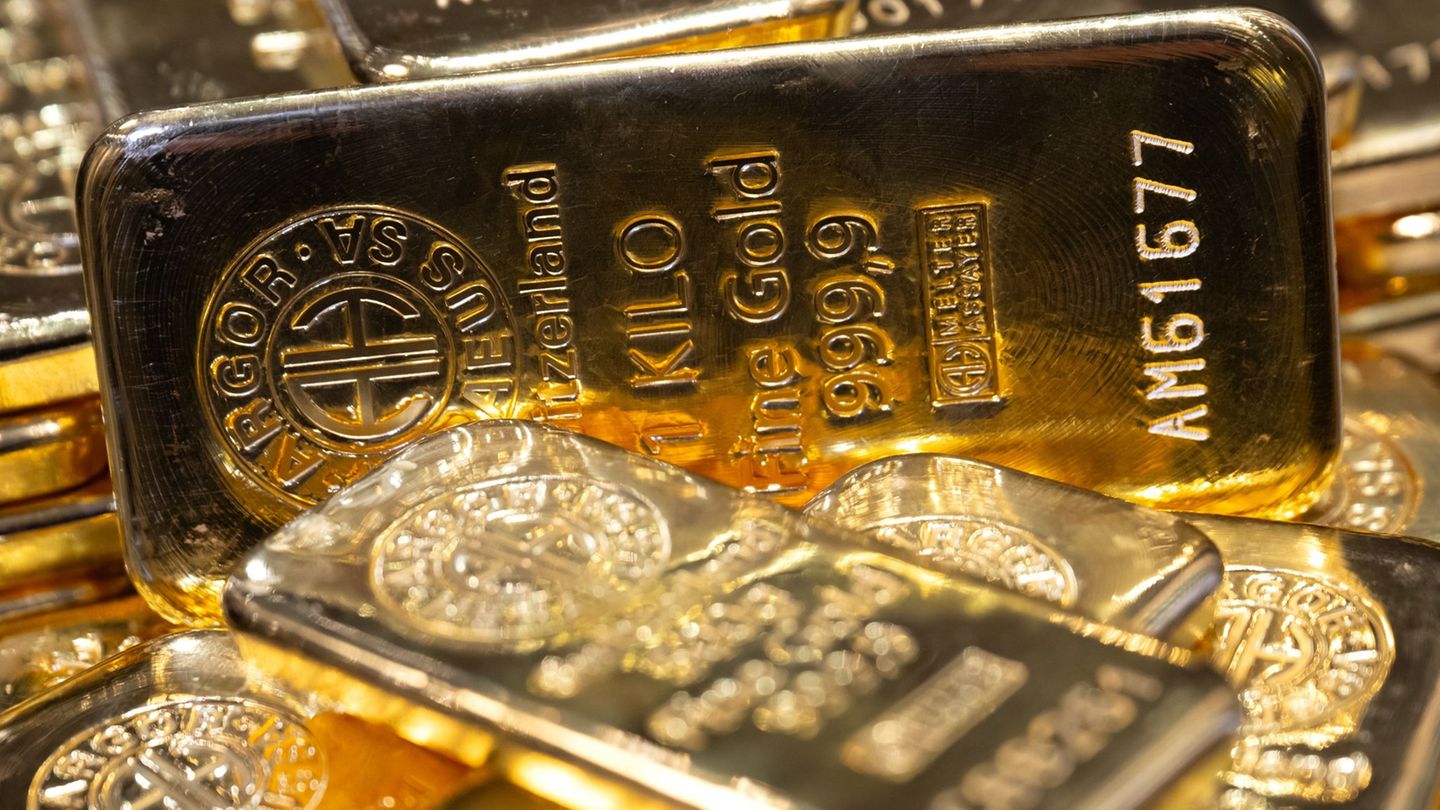At the three-way meeting with the French and Polish heads of state, Chancellor Olaf Scholz once again addressed clear words in the direction of Moscow. If Russia dares to invade Ukraine, there will be dire consequences.
Crisis diplomacy in Ukraine is gaining momentum. At a tripartite summit in Berlin, Germany, France and Poland called for negotiations to avoid war in Europe. Chancellor Olaf Scholz called the Russian troop deployment on the border with Ukraine “very worrying” at the meeting with Presidents Emmanuel Macron and Andrzej Duda on Tuesday. “Our common goal is to prevent a war in Europe,” said the SPD politician.
The chancellor again threatened Russia with “far-reaching consequences” if it invaded the neighboring country, a former Soviet republic. These consequences would be “political, economic and certainly also geostrategic”. Macron also said that a war must be prevented. “The peace and stability of the European continent are our treasure.” Everything must be done to preserve it.
Duda: NATO and EU are experiencing the most difficult moment since 1989
Duda spoke of the “most difficult situation in which NATO and the EU have found themselves since 1989”, the year the wall fell. Referring to the Russian troop deployment, he said: “We are all wondering what will happen after that. What effect will this movement of troops have, which the world and Europe has not seen since World War II?”
Macron came to Berlin following mediation talks in Moscow and Kiev. Scholz spoke to US President Joe Biden in Washington on Monday. The meeting with Duda was now used for coordination within the European Union. In Poland, the German course in the Ukraine crisis is viewed critically. Above all, the German refusal to deliver arms to Ukraine is not well received in Germany’s neighboring country, which also borders Russia. With a view to the controversial Nord Stream 2 gas pipeline, they would like to see a tougher course towards Russia.
Scholz says that in the event of an invasion, all sanction options are on the table. However, he does not explicitly mention Nord Stream 2. He also refrained from doing so on his first visit to Washington. US President Joe Biden, on the other hand, made it clear that a Russian invasion would mean the end of Nord Stream 2. After all, Scholz promised: “We will act in full agreement on the sanctions.”
Olaf Scholz on the first “Weimar Triangle” in eleven years
Macron came to Berlin from Kiev. In his talks with the Ukrainian President Volodymyr Zelenskyj – as before with the Russian President Vladimir Putin – there was no breakthrough. For Thursday, the French President announced further talks with representatives of Russia and Ukraine at advisor level, which are to take place in Berlin. France and Germany have been mediating in the conflict for years as part of the so-called Normandy format.
Zelenskyy described the talks as “very fruitful”, but did not comment on possible progress in the implementation of the 2015 Minsk peace plan. At the same time, he expected a high-level meeting in the Normandy format “in the near future”. The last summit with Russia and Ukraine was in Paris in 2019. Macron negotiated with Putin in Moscow for almost six hours on Monday evening. “I have achieved that there is no deterioration and no escalation,” he said.
Foreign Minister Annalena Baerbock called for a peaceful solution in eastern Ukraine. “We will not be able to resolve this aggression from the Russian side militarily. That’s why I’m doing everything to ensure that we make step-by-step progress at the negotiating table,” said the Greens politician in the Donbass crisis area. Protected by a helmet and bulletproof vest, Baerbock had a commander of the Ukrainian government troops explain the military situation to him. Baerbock demanded that an agreed ceasefire be observed. The situation is “highly dramatic”.
Moscow: Urgently needed de-escalation
The Kremlin in Moscow also said that a de-escalation was “very necessary” in view of the tensions. With a view to joint maneuvers with Belarus, Putin’s spokesman Dmitry Peskov confirmed that the Russian soldiers sent will leave the neighboring country after the end of the exercise. Fears are expressed in the West that the Kremlin could prepare for an invasion of Ukraine by moving troops. Moscow has always said that the exercise, which begins on Thursday, is in accordance with international law.
With a view to a massive deployment of soldiers on Russian territory near Ukraine, the West has been warning of a possible invasion for weeks. Moscow denies that. It is also considered possible that the Russian side wants to stir up fears in order to persuade NATO to make concessions on demands for security guarantees. Meanwhile, more US soldiers landed in Poland for the fourth day in a row. US soldiers also arrived in Romania to reinforce NATO’s eastern flank.
Source: Stern
David William is a talented author who has made a name for himself in the world of writing. He is a professional author who writes on a wide range of topics, from general interest to opinion news. David is currently working as a writer at 24 hours worlds where he brings his unique perspective and in-depth research to his articles, making them both informative and engaging.




